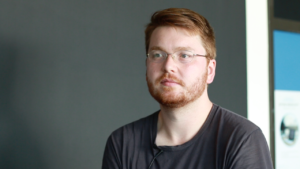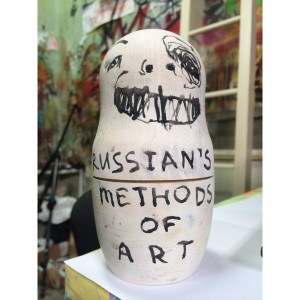It’s difficult to say what ‘art’ is. I should have thought about it before. I can only answer in a rather emotional way. So, … for example, last week, the week before and the week before that even, I was in Berlin. There are a lot of young people going to Syria to fight, some sixteen- or twenty-year-olds, dying for this. And they are Salafists. That’s something I am interested in, but I don’t exactly know what part of it. I meet people. Relatives, lawyers, the few who come back and are in prison now. I even visited them in prison. These conversations were always saturated by slight depression, by a futility. There was sometimes a brief moment where I thought this is IT, … this could be IT. To end my research and switch to an active mode… to me, in this moment, it starts to become art. Before that, it is research, it is documentary work or journalism. Art begins where I suddenly feel the need to work it out. And now, I know I need to do it anyway. I have a premiere date. But I am searching in this odd sort of way. And as I said, I am intelligent enough to say: this twenty interviews must get transcribed now, then I go into the room just make a collage, then I invite five actors and then we speak through this collage with varies disguised voices in the room. So, I am not stupid. And this is ninety percent of the theater. But this is not art. I think academic art does not exist any more in visual arts. In the theater it still exists. That is the funny thing about it. Nowadays you can visit a theater or film college and you are served the classics and you need to work on it as a director. You develop your fifty tricks, you refine them and then you probably die sometime. But you are on a sophisticated level. Art is … you can feel it in works of art …and to most of the works this doesn’t apply. One can also feel the inevitable presence of a necessity in these works. I think I can differentiate those two kinds of work apart from any craftsmanship – at least in theater or film. As soon as I see a movie or a play I notice it. No one can deceive with professionalism. This is actually quite strange, but you know that. We do have to die in the end – now I am simplifying a bit. It is all very existential. It is not like we can just play around. So this is not reality. And because of that, you can tell when someone tries giving answers – to be a bit outdated – to existential questions or being professional. But you can see the difference. As I said, I try to produce a situation in where everything what is done, is done for a purpose, where nothing is irrelevant. And … somehow there is a bit of an alibi for what is being done. So for me, for example, the shooting of the Ceausescu is the alibi to make the piece. The historical event is an alibi. Or … the trials in Russia, to revive them and give a voice to the creditors and the artists. It is really an alibi to do that. That is an excuse, but one has to take it totally serious. To take it absolutely seriously does not mean that everything is very serious. It is usually very funny or grotesque. But it is as if one… one of my participants in the Moscow trails, the court usher, so the head of the Sakharov Center, where I produced it, said it was for him basically like a daydream. What we were doing there is totally real, but in reality it is totally impossible. And that is the essence of the theater; there is a presence of something that may not be possible in reality. But to me it is important that it is real, because I have the presence of Chekhov. I just don’t care. It may happen that this is obsolete in two years and then I do authentic Chekhov productions. In Germany – caused by Wagner and his admirer, which are numerous, among others Schlingensief, Kastov, all worship Wagner, including myself. … but because of that, a wrong idea of the ‚total artwork‘ has evolved: the feeling that all kinds of media must be united in one context. You have to make an opera where you include video and then you need political insults, or whatever. And then you have everything at Bayreuth on the green hills or on the Volksbühne. And I actually believe that the Gesamtkunstwerk (engl.: ’synthesis of the arts‘), it’s a rather old concept, and it means throwing a stone into the water and getting waves. Waves that the artist wasn’t able to foresee. You do things you know are powerful but have lots of different possible interpretations. So you don’t really know what happens.
Das ist schwierig zu beantworten, was Kunst ist. Das hätte ich mir wirklich vorher überlegen sollen. Ich kann das fast nur emotional beantworten. Wie gesagt, ich muss persönlich… Also beispielsweise ich war vorletzte und letzte und vorvorletzte usw. Woche, in Berlin und habe zu diesem Ganzen…Es gibt sehr viele Jugendliche, die nach Syrien gehen, um da zu kämpfen, die sind teilweise sechzehn Jahre alt oder zwanzig Jahre alt und dadurch ums Leben kommen, was auch immer. Und das sind Salafisten. Und das ist etwas, das mich interessiert. Und ich weiß nicht genau was. Und ich treffe jetzt Leute. Verwandte, Anwälte, die Wenigen, die zurück gekommen und jetzt im Gefängnis sind, habe ich im Gefängnis besucht. Diese Gespräche waren aber immer von einer leichten Depression unterspült. Von einer Vergeblichkeit. Es gab manchmal einen kurzen Moment wo ich dachte: Das könnte es, das könnt es sein und so. Und quasi die Suche zu beenden, um in den aktiven Modus über zu gehen. Das ist es eigentlich. Dann beginnt für mich irgendwie die Kunst. Vorher ist es Recherche, ist es dokumentarisches Arbeiten, es ist Journalismus. Kunst beginnt dann, wo ich auf einmal die Notwendigkeit spüre etwas daraus zu machen. Und jetzt weiß ich, ich muss es irgendwie. Ich habe einen Premierentermin. Ich bin aber so komisch am suchen. Und wie gesagt, ich bin intelligent genug, um der Assistentin zu sagen: Diese zwanzig Interviews werden jetzt transkribiert, dann gehe ich kurz ins Zimmer mache eine Collage, dann lade ich fünf Schauspieler ein und dann sprechen wir diese Collage mit so und so verstellten Stimmen im Raum. Also ich bin nicht blöd. Und das ist neunzig Prozent des Theaters. Das ist aber keine Kunst. Ich glaube es gibt in der Bildenden Kunst gibt es die akademische Kunst nicht mehr. Im Theater gibt es sie noch. Das ist das Komische.
Du kannst heutzutage eine Regieschule besuchen und dann werden dir die Klassiker vorgesetzt und die musst du bearbeiten als Regisseur. Dann entwickelst du deine fünfzig Tricks und die verfeinerst du eigentlich und dann stirbst du vermutlich irgendwann. Aber dann bist du auf hohem Niveau oder? Kunst ist… man kann es übrigens auch spüren in Kunstwerken. Und es trifft ja meistens nicht zu. Man kann die zwangsläufige Anwesenheit der Notwendigkeit in Kunstwerken auch spüren. Also ich würde behaupten, dass ich über alle Meisterschaft hinaus –zumindest im Theater oder im Film– unterscheiden kann sobald ich einen Film sehe oder ein Stück. Dann merke ich das sofort. Also niemand kann einen mit Professionalität täuschen. Das ist eigentlich ganz seltsam aber man weiß das halt als Mensch. Also müssen ja am Schluss – ich vereinfache jetzt ein bisschen – sterben; es ist ja alles extrem existentiell. Es ist ja nicht so, dass wir nur herum spielen können. Also das ist nicht die Realität des Lebens. Und deshalb merkt man schon, ob jemand versucht, indem er so tut, also wenn ich jetzt ein bisschen altmodisch sein darf auf diese Existenzialität zu antworten. Das eben nicht zu tun und halt professionell zu sein, was auch okay ist. Aber man merkt den Unterschied. Ich versuche, wie gesagt, immer eine Situation herzustellen, in der alles was getan wird von Belang ist. Wo es auch ein bisschen ein Alibi ist was überhaupt gemacht wird. Also für mich ist beispielsweise ist die Erschießung der Ceausescus ein Alibi um das Stück zu machen. Die historische Vorlage ist ein Alibi. Oder auch diese Prozesse, die in Russland statt gefunden haben. Die dann wieder aufzunehmen und eigentlich die Gläubiger und die Künstler sprechen zu lassen. Das ist wirklich ein Alibi, dass man das macht. Das ist ein Vorwand, den man aber total ernstnehmen muss. Also ernstnehmen muss heißt nicht, dass alles ganz ernst ist. Es ist ja meistens auch sehr lustig oder grotesk was da geschieht. Also einer meiner Beteiligten an den Moskauer Prozessen, der Gerichtsdiener, also der Leiter des Sacharow Zentrums, wo ich es gemacht habe, hat gesagt, es sei für ihn im Grunde wie ein Wachtraum, was wir da machen. Es ist alles total real, in der Realität ist es aber total unmöglich. Und das ist das Wesen, das Spielen des Theaters, dass du eine Präsenz hast von etwas, was unmöglich sein kann. Aber mir ist es wichtig, dass es real ist, weil ich die Präsenz habe von Tschechow. Es interessiert mich einfach nicht. Es kann auch sein, dass das in zwei Jahren überholt ist und ich dann werktreue Tschechow- Inszenierungen mache. In Deutschland herrscht durch Wagner und seine Verehrer, die zahlreich sind unter anderem Schlingensief, Castorf, keine Ahnung alle verehren Wagner. Ich inklusive. Aber es herrscht dadurch ein glaube ich falscher Begriff vom Gesamtkunstwerk. Nämlich immer noch dieses Gefühl, dass in einem Kontext alle Medien vereint werden müssen. Also du musst eine Oper machen wo du dann noch Video hast und dann hast du irgendwie noch politische Beleidigungen, was auch immer und das hast du dann alles auf Bayreuth auf dem grünem Hügel oder du hast alles in der Volksbühne oder so. Und ich glaube eigentlich, dass ein Gesamtkunstwerk eher – das ist aber auch ein alter Begriff – also einem Stein gleicht, den man ins Wasser schmeißt und der Wellen wirft, die der Gesamtkünstler quasi gar nicht vorausgesehen hat. Also, dass man Dinge tut, von denen man weiß, dass sie Kraft haben, aber auch in ihrer möglichen Interpretation so vielseitig sind, dass du eigentlich gar nicht weißt was passiert.

















